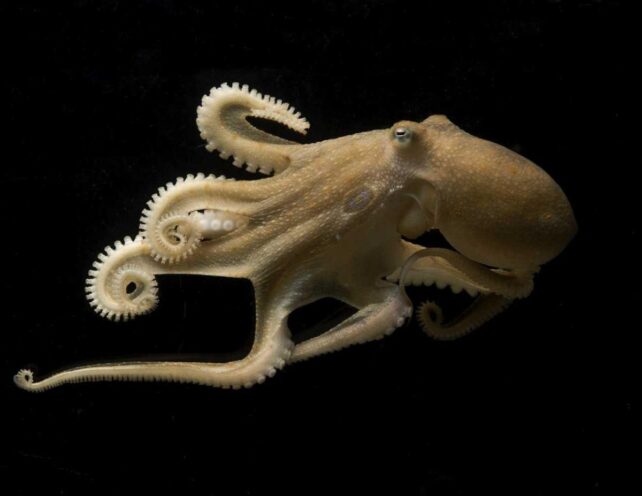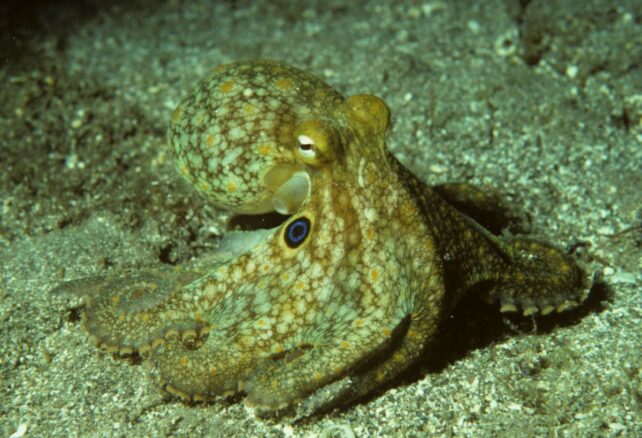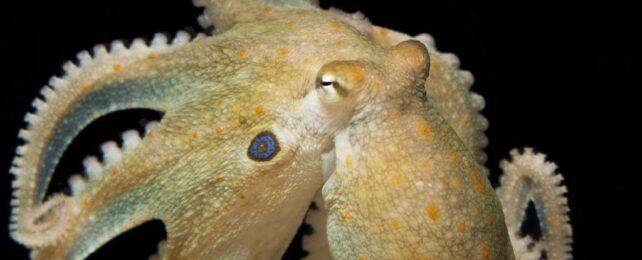Octopuses have found an incredible way to protect the more delicate features of their nervous system against radically changing temperatures.
When conditions fluctuate, they can rapidly recode key proteins in their nerve cells, ensuring critical neurological activities remain functional when temperatures drop dramatically.
How do they do it? By deploying a rare superpower – editing their RNA on the fly, an ability found in some species of octopuses, squids and cuttlefish.
It's an unusual strategy, but it appears to be an effective one, and scientists believe that it may be widely adopted throughout the world of cephalopods.
"We generally think that our genetic information is fixed, but the environment can influence how you encode proteins, and in cephalopods this happens on a massive scale," says marine biologist Joshua Rosenthal of The University of Chicago's Marine Biological Laboratory, senior author on new research published in Cell.
"RNA recoding gives organisms the option to express a diverse quiver of proteins when and where they choose. In cephalopods, most of the recoding is for proteins that are really important for nervous system function, so the natural question is, are they using this to acclimate to changes in their physical environment?"

Our own genetic instructions for survival can change, but it tends to happen slowly, with generational tweaking of DNA. Variations in the genetic code determine the ultimate shape and function of individual proteins that build our bodies, including the systems and structural supports inside our brain.
DNA doesn't make the proteins directly, though. Those chemically encoded instructions remain in the nucleus of your cells, issuing templates through an intermediate molecule called messenger RNA (or mRNA), which travels from the nucleus into the surrounding goo to feed into tiny protein-building machines.
In most organisms, this is pretty straightforward; once the template is issued, no more change occurs to the RNA. In cephalopods, however, things are a little different.
In 2015, scientists found that squids, cuttlefish, and octopuses can tweak the RNA after it has left the nucleus, editing on the fly, allowing for a rapid physiological response to … what?
Some scientists thought it might be the reason cephalopods are so strangely, fascinatingly smart, but the reason for it has eluded us, and baffled scientists.
Adapting to temporary environmental changes seemed like a plausible explanation. Marine organisms are subjected to a wide range of temperatures, and octopuses lack the ability to actively thermoregulate. RNA editing would offer the ability to change, and change again as conditions dictate, without the long-term implementation and relative permanence of DNA editing.
So, led by marine biologist Matthew Birk of the Marine Biological Laboratory and Saint Francis University, a team of researchers put this notion to the test.

Their subjects were California two-spot octopuses (Octopus bimaculoides), whose entire genome was first sequenced in 2005, making it a useful animal for understanding genetic changes.
The researchers acclimated these octopuses to warm water at 22 degrees Celsius (71.6 Fahrenheit) or much chillier water at 13 degrees Celsius (55.4 Fahrenheit), then compared their genetic information against the database genome. They specifically looked at over 60,000 known editing sites, and what they found was astonishing.
"Temperature-sensitive editing occurred at about one third of our sites – over 20,000 individual places – so this is not something that happens here or there; this is a global phenomenon," says physicist Eli Eisenberg of Tel-Aviv University, co-senior author of the paper.
"But that being said, it does not happen equally: proteins that are edited tend to be neural proteins, and almost all sites that are temperature sensitive are more highly edited in the cold."
So the editing seemed to be in response to acclimating to cold, rather than warm water, affecting neural proteins that, specifically, are sensitive to cold temperatures. And tests of structural proteins critical for the function of the octopus nervous system – kinesin and synaptotagmin – found that the changes wrought would have an impact on their function.

It was possible that what the team observed was the result of being in a lab, so they caught wild California two-spot octopuses and Verrill's two-spot octopuses (Octopus bimaculatus) in Summer and Winter and checked their genomes, too. These octopuses had similar patterns of RNA editing that suggested they were optimizing their function for the current temperature conditions.
The team also tested to see how quickly the changes take place. They tweaked the temperature of an octopus's tank from 14 degrees Celsius to 24 degrees Celsius or vice versa, tuning the temperature up or down by 0.5 degrees increments over the course of 20 hours. They tested the extent of RNA editing in each octopus just before starting the temperature change, just after, and four days later.
It happens very quickly, the researchers found.
"We had no real idea how quickly this can occur: whether it takes weeks or hours," Birk explains. "We could see significant changes in less than a day, and within four days, they were at the new steady-state levels that you find them in after a month."
These findings suggest that at least one function of cephalopod RNA editing is a rapid response to conditions that might be dangerous to the animals otherwise. There are also other environmental variables that could invoke a response. These include low oxygen, pollution, and changing social conditions.
The researchers suspect that RNA editing is a fairly widespread strategy among octopuses and squids to stay alive as their environment changes, and plan to investigate how it is used in greater detail.
The research has been published in Cell.
